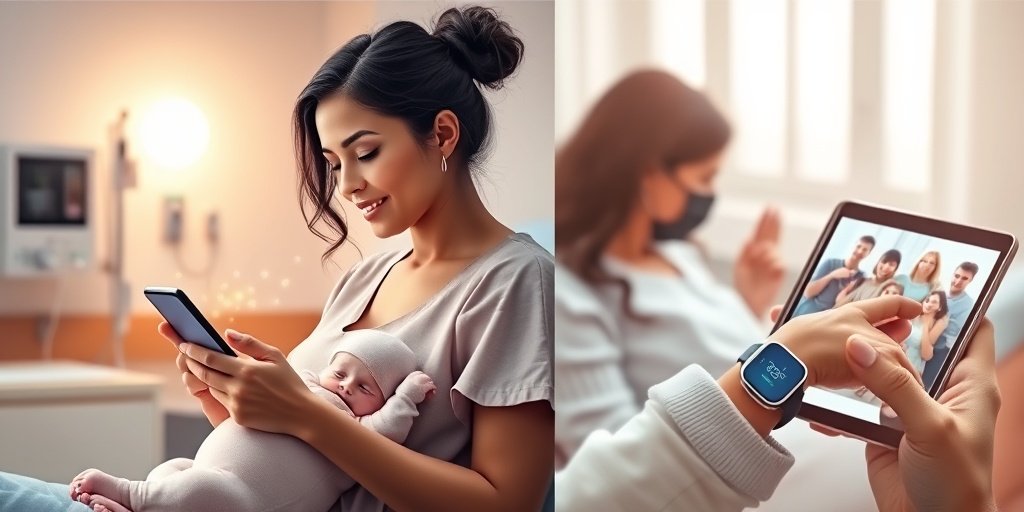⚡ Quick Summary
This qualitative study explored the perinatal experiences of 30 at-risk mothers and their engagement with mobile-health-based care. Findings revealed that mothers utilizing the SMART program felt significantly more supported compared to those relying on traditional support systems.
🔍 Key Details
- 👩👧👦 Participants: 30 at-risk mothers, including those who are single, low-income, or have mental health challenges.
- 📅 Study Duration: Conducted between February and September 2024.
- 📍 Location: Tertiary public hospital in Singapore.
- 📝 Methodology: One-to-one semi-structured interviews analyzed through thematic analysis.
🔑 Key Takeaways
- 🌍 Four main themes emerged from the interviews: vulnerability, strength, generational tensions, and reimagining perinatal care.
- 🤝 Mothers in the intervention group reported holistic support through the SMART program.
- 📱 Control group mothers relied on ad hoc support, primarily from social media.
- 💔 Social isolation and emotional strain were common challenges faced by all participants.
- 💡 Mobile-health interventions can be integral to nursing care for at-risk mothers.
- 🧠 Future research should focus on culturally compatible support tailored to specific vulnerabilities.
- 💰 Increased funding and contact are essential for effective interventions.
- 🤖 Technologies like AI and health monitoring trackers can enhance future perinatal care.

📚 Background
The perinatal period is a critical time for mothers, especially those classified as at-risk due to various socio-economic and psychological factors. Understanding their experiences and the support they receive is vital for improving maternal health outcomes. With the rise of mobile health technologies, there is an opportunity to provide tailored support that addresses the unique challenges faced by these mothers.
🗒️ Study
This qualitative descriptive study involved semi-structured interviews with 30 at-risk mothers, defined by criteria such as single parenthood, low income, and mental health challenges. The aim was to gain insights into their perinatal experiences and their engagement with mobile health interventions, particularly the SMART program, which offers multimedia educational resources and peer support.
📈 Results
The analysis revealed four overarching themes that encapsulated the mothers’ experiences. Notably, those who participated in the SMART program reported feeling more supported and less isolated compared to their counterparts in the control group. The findings highlighted the importance of holistic support systems in enhancing the psychological well-being of at-risk mothers during the perinatal period.
🌍 Impact and Implications
The study underscores the potential of mobile-health-based interventions to significantly improve the psychological well-being of vulnerable mothers globally. By integrating such technologies into standard nursing care, healthcare providers can offer more effective support tailored to the unique needs of at-risk populations. This approach not only addresses immediate challenges but also fosters long-term maternal and child health outcomes.
🔮 Conclusion
This research highlights the critical role of mobile health interventions in supporting at-risk mothers during the perinatal period. By providing holistic and culturally compatible care, we can enhance the experiences of these mothers and improve their overall well-being. The future of maternal health care lies in embracing innovative technologies and ensuring that support systems are accessible and effective.
💬 Your comments
What are your thoughts on the role of mobile health technologies in supporting at-risk mothers? We would love to hear your insights! 💬 Join the conversation in the comments below or connect with us on social media:
A Window Into Vulnerability and Support: At-Risk Mothers’ Perinatal Experiences and Perspectives on mHealth-Based Care.
Abstract
AIM: To examine the perinatal experiences of at-risk mothers and their engagement with mobile-health-based care.
DESIGN: A qualitative descriptive study.
METHODS: One-to-one semi-structured interviews were conducted with 30 at-risk mothers, defined as those who were single, had low income, were at risk of depression, had adverse childhood experiences, gave birth to a baby with congenital disorders, or had a history of mental health conditions. Participants were purposively sampled at 6 months postpartum from a tertiary public hospital in Singapore between February and September 2024. Interviews continued until data saturation was achieved, were audio-recorded, transcribed verbatim and analysed using thematic analysis.
RESULTS: The study identified four overarching themes: (a) Me and my baby versus the world, (b) navigating vulnerability and strength in motherhood, (c) generational tensions in modern parenting and (d) reimagining perinatal care for every mother. Across the perinatal period, both intervention and control group mothers reported social isolation, emotional and physical strain and challenges balancing traditional family expectations with modern parenting practices. While mothers in the intervention group described receiving holistic support through the SMART program, those in the control group relied on ad hoc sources of support, such as social media platforms.
CONCLUSIONS: At-risk mothers experienced significant challenges during the perinatal period, and those who used a mobile-health-based perinatal intervention felt supported through its peer support and multimedia educational resources.
IMPLICATIONS FOR NURSING: Mobile-health-based interventions can be integral aspects of standard nursing care. Future researchers must ensure that support rendered to at-risk mothers is culturally compatible and specific to the psychosocial vulnerabilities they experience. Increased contact and funding are vital, whereas artificial intelligence, multiple shared access and health monitoring trackers can shape future perinatal interventions.
IMPACT: A mobile-health-based perinatal intervention can have an enormous positive impact on the psychological well-being of vulnerable mothers worldwide.
REPORTING METHOD: This study followed the Consolidated Criteria for Reporting Qualitative Research (COREQ) checklist.
PATIENT OF PUBLIC CONTRIBUTION: This study did not include patient or public involvement in its design, conduct or reporting.
STUDY REGISTRATION: ClinicalTrials.gov (Registration ID: NCT06363019). Registered 4/12/23, first recruitment on 26/02/2024.
Author: [‘Shah L’, ‘Aayisha’, ‘Goh YS’, ‘Choolani M’, ‘Eriksson JG’, ‘Chee CYI’, ‘Chong SC’, ‘Mathews J’, ‘Lim LHK’, ‘Mörelius E’, ‘Shorey S’]
Journal: J Adv Nurs
Citation: Shah L, et al. A Window Into Vulnerability and Support: At-Risk Mothers’ Perinatal Experiences and Perspectives on mHealth-Based Care. A Window Into Vulnerability and Support: At-Risk Mothers’ Perinatal Experiences and Perspectives on mHealth-Based Care. 2025; (unknown volume):(unknown pages). doi: 10.1111/jan.70292